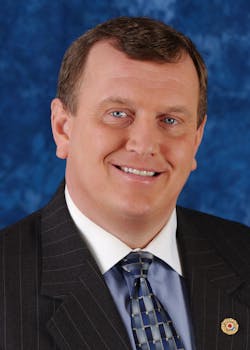The recent 30th annual Congressional Fire Services Caucus dinner provided an opportunity to reflect on the collective success of the American fire service.
Then and now
As a young firefighter, I attended the very first dinner. At that time, I honestly had no appreciation of the politics that confront every firefighter and fire department, large and small, from coast to coast. But now, to ignore the political ramifications, budgetary restraints and challenges we face is professional malfeasance.
Back in those bygone days, Curt Weldon, a young Congressman and a volunteer fire chief in Marcus Hook, PA, formed a bipartisan Congressional Fire Caucus and held a dinner to bring together all segments of the fire service—career and volunteer, labor and management, affinity organizations, vendors, various governmental agencies and members of Congress—for education and advocacy.
Fire service luminaries like Harold Schaitberger from the IAFF, Jim Estepp from the IAFC, Steve Austin and the late Jim Monihan from the volunteer sector, Denny Compton from the instructors, and many others provided the resolve and muscle to build the Congressional Fire Services Institute (CFSI) and encourage members of Congress to join the Fire Services Caucus.
In short order, the Fire Caucus grew into the largest on the Hill. The Caucus boasts as members the speaker of the house, both the Senate and House of Representatives Democrat and Republican leaders, and more than half of Congress. The fire service has succeeded in bridging the partisan divide to unite supporters of our issues and industry.
The bad news is that more than 200 members of Congress are NOT in the Fire Caucus. It is OUR responsibility to educate those senators and representatives and demand they join. This should be our litmus test: Either you stand with firefighters or you do not. It’s not complicated.
I also encourage our lobbyists in state capitols to replicate the effort in Washington, DC, and form fire caucuses in your respective legislatures.
The IAFF has long promoted the idea that “In Unity, There Is Strength.” That maxim epitomizes the National Advisory Council of CFSI. ALL major fire organizations participate. Certainly each organization has its own priorities, but all groups unite and speak as one voice to advance the mission and key legislative goals of the fire service.
Progress achieved
The past 30 years have demonstrated that our unity has worked. More importantly, it continues to bear fruit. Many pundits consider this Congress to be one of the least productive. From a fire service perspective, nothing could be further from the truth. Our accomplishments in the 115th Congress are laudable.
Public Law 115-98 reauthorized the Assistance to Firefighters Grant (AFG) program and Staffing for Adequate Fire and Emergency Response (SAFER). The president’s signature extended these programs and authorized their funding for another seven years. The same law reauthorized the U.S. Fire Administration and the National Fire Academy.
A decade-long crusade to promote the greater use of sprinklers was achieved with the passage of the Fire Sprinkler Incentive Act, Public Law 115-97. Another measure, House Resolution 4460, promotes and incentivizes states to adopt more building codes to improve fire safety.
Well intended but misguided bureaucrats tried to sideline paramedics and firefighters from dispensing medications to combat the opioid epidemic. We fought back and passed the Protecting Patient Access to Emergency Medications Act, Public Law 115-83.
In several states, weak-kneed politicos sometimes refused to lower the colors to half-mast when a firefighter died in the line of duty. House Resolution 1892 confers on governors the right to lower the colors when a line-of-duty death occurs.
Get involved
The combined lobbying forces of CFSI and affiliated organizations successfully battle to kill bad legislation and work on issues ranging from research grants to firefighter safety and a host of other measures that make our jobs safer and improve public safety.
The work continues. Fire service lobbyists are advocating for collective bargaining rights for career firefighters and tax incentives for volunteers. They work tirelessly to expand FirstNet, our new nationwide interoperable communications system while protecting the ability of major metropolitan areas to remain on tried-and-true T-Band frequencies.
All of us have a duty to be informed. I challenge you to take the next step and become involved.
About the Author

Kevin O’Connor
KEVIN O’CONNOR is the founder and principal of O’Connor CARES, Inc., an advocacy and consulting firm for organizations in the emergency response, homeland security, communications and public health space. He formerly headed Governmental Affairs and Public Policy for the IAFF. O’Connor served as past chair of the Congressional Fire Service Institute. He began his career as a firefighter/EMT in the Baltimore County Fire Department and was the 2010 recipient of the Motorola/CFSI Mason Langford Award for Lifetime Achievement in the Fire Service.
